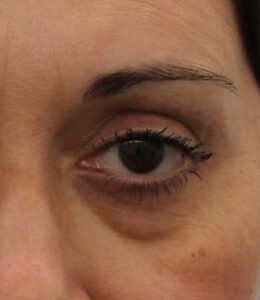Eye diseases
Dark circles

What are dark circles?
The skin around the eyes is the thinnest on the body – 5 times more than that on the rest of the face –; thus, it is particularly affected by aesthetic problems (link). One of the most common issues, both in young and older people, are dark circles, due to an alteration in the skin colour under the eyes.
This darkening of the area gives the face a tired and “dull” appearance and, mainly, can be caused by.
- Excess pigmentation (melanin), which gives a darker colour.
- Thinning of the skin, so that the vascular network underneath becomes transparent, and a purple shade appears.
Sinking in the area from the eye to the cheek (nasojugal sulcus), as a result of which dark circles are even more evident.
Causes and risk factors
Treatment
Although dark circles are usually associated with lack of sleep – a factor that worsens them –, you can notice them on your face even when you have a good rest. In fact, there are many causes that can cause them, whereas in some people they have a genetic origin. This is the case of hereditary purplish dark circles in some families or of racially pigmented dark circles, which are characteristic of darker skin, such as that of Arabs.
As for acquired factors, sun exposure can also cause spots that darken the area. On the other hand, certain pathologies, such as allergies or thyroid problems, also cause more pronounced dark circles.



